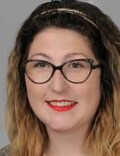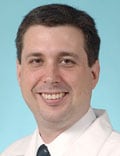
Amy Costa
Poor objective sleep efficiency may contribute to older adults overestimating their cognitive abilities, preliminary findings from a pilot study of objective and subjective cognitive measures have shown.
The pilot study underscored the important role of objective sleep measures to better understand discrepancies when patients’ own reports of everyday cognitive function don’t align with objective cognitive profiles, Amy Costa, MA, a graduate student in psychology at the University of Missouri-Columbia, said in reporting the results at the annual meeting of the Associated Professional Sleep Societies.
“Between our previously published paper and these new pilot results, we’re reporting evidence that suggests sleep is playing a role between the objective and subjective cognition relationship,” Costa said in an interview. “It is possible that these older adults who are sleeping poorly may be worse at understanding how well they’re doing cognitively. That’s really important for doctors. For example, if we can’t diagnose someone with mild cognitive impairment or Alzheimer’s disease or other types of dementia earlier, then we can’t intervene as quickly.”
Sleep Efficiency, Cognition, and Patient Complaints
These findings are in agreement with those Costa and colleagues recently published in the Journal of Clinical Sleep Medicine, she said.
The current pilot study included 35 older adults with an average age of 69 years who had insomnia complaints. They completed one night of home-based polysomnography – specifically with the Sleep Profiler PSG2TM – and a battery of cognitive tests. Their average sleep deficiency was 57%, “indicating potentially pretty severe insomnia,” Costa said.
“We found that sleep efficiency – that is the percentage of time spent sleeping while in bed – moderated the association between self reports and objective measures of cognitive distractibility,” Costa said in reporting the results. “In other words, our findings suggest that individuals with lower sleep efficiency who are performing the worst cognitively have the least amount of complaints. Basically, this can be thought of as that they are overestimating their cognitive performance.”
Sleep Stage Versus Working Memory and Distractibility
The pilot study also focused on how the percentage of lighter-stage sleep, or N1 sleep, moderated the associations between working memory, as measured by Sternberg performance, and memory, distractibility, and blunders measured with the Cognitive Failures Questionnaire.
At the highest percentage of N1 sleep, worse working memory was associated with fewer complaints about memory, distractibility, and blunders, Costa said.
“The percentage of lighter-stage N1 sleep and sleep efficiency moderated the association between cognitive flexibility and distractibility,” Costa said. At the lowest percentage of N1 sleep, worse cognitive flexibility was associated with more distractibility, while at the highest percentage of N1 sleep worse cognitive flexibility showed a reverse effect; it was linked to less distractibility. The lowest percentage of sleep efficiency showed an association between worse cognitive flexibility and less distractibility, but the highest percentage of SE showed an association between worse cognitive flexibility and more distractibility.
“So in terms of evaluating their cognitive performance, the worse working memory was associated with more blunder complaints in individuals with the lowest percentage of N1,” she said. “So whenever individuals were spending less time in N1, they were able to better recognized their cognitive ability.”
She added, “Overall, more light and more fragmented sleep moderated the association between worse objective and less cognitive complaints, suggesting that these individuals might be overestimating their cognitive abilities.”
The findings indicate that evaluation of objective sleep should consider objectively measured N1 and sleep efficiency to better understand when subjective cognitive complaints and neurophysiological/objective cognitive profiles don’t align, she said.
Important Indicators of Cognitive Deficits
“Specifically, for an older adult who comes into the clinic with complaints of waking up during the night, low sleep efficiency and more lighter-stage sleep might be really important indicators that they are probably not going to be the best at identifying their cognitive abilities or deficits,” she said.
Future directions for this research include collecting more data and looking at other sleep measures, such as using rapid-eye movement sleep, as potential moderators for the relationship between cognitive outcomes, evaluating sleep architecture more closely, and evaluating outcomes in a longitudinal study, Costa said.
The Importance of Objectively Measured Sleep

Dr Brendan P. Lucey
“Studies like this one using objectively measured sleep are important because much of the prior literature relied on self-reported sleep measures,” said Brendan P. Lucey, MD, associate professor of neurology and head of the sleep medicine section at Washington University School of Medicine in St. Louis. “This study suggests how objectively measured sleep may mediate discrepancies in objective/subjective cognitive dysfunction. Future studies need to work out if we need to add objective sleep measures when evaluating cognitive complaints in older adults.”
Lucey, who was not involved in the study, voiced one concern with the pilot study methodology the future research should address: the use of the Sleep Profiler PSG2TM to measure N1 sleep, which, as he noted, records a single-channel electroencephalogram over the forehead. “Scoring N1 sleep relies on attenuation of the alpha rhythm over the occipital region and the Sleep Profiler is not as accurate as in-lab polysomnography for this sleep stage,” he said.
The pilot study received funding from the American Academy of Sleep Medicine Foundation. Costa and her coauthors have no disclosures. Lucey disclosed relationships with Merck, Eli Lilly, Eisai, and Beacon Biosignals.
This article originally appeared on MDedge.com, part of the Medscape Professional Network.
Source: Read Full Article
